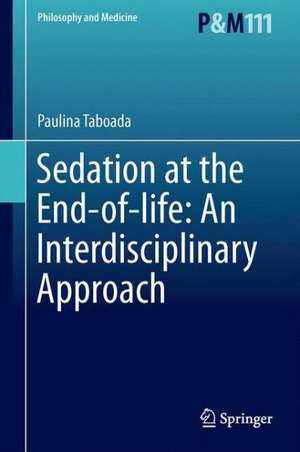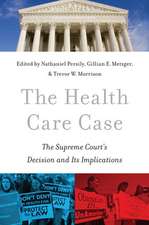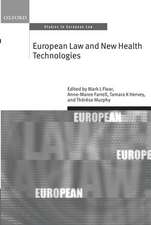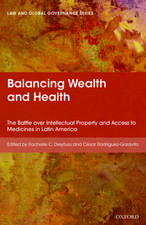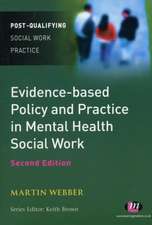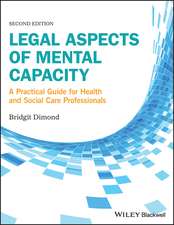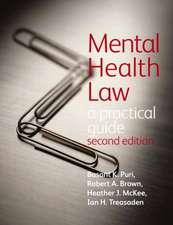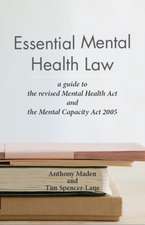Sedation at the End-of-life: An Interdisciplinary Approach: Philosophy and Medicine, cartea 116
Editat de Paulina Taboadaen Limba Engleză Hardback – 3 noi 2014
| Toate formatele și edițiile | Preț | Express |
|---|---|---|
| Paperback (1) | 382.36 lei 43-57 zile | |
| SPRINGER NETHERLANDS – 10 sep 2016 | 382.36 lei 43-57 zile | |
| Hardback (1) | 389.70 lei 43-57 zile | |
| SPRINGER NETHERLANDS – 3 noi 2014 | 389.70 lei 43-57 zile |
Din seria Philosophy and Medicine
- 18%
 Preț: 3071.11 lei
Preț: 3071.11 lei - 18%
 Preț: 789.52 lei
Preț: 789.52 lei - 15%
 Preț: 636.80 lei
Preț: 636.80 lei - 15%
 Preț: 643.16 lei
Preț: 643.16 lei - 15%
 Preț: 644.95 lei
Preț: 644.95 lei - 18%
 Preț: 949.23 lei
Preț: 949.23 lei - 5%
 Preț: 1154.22 lei
Preț: 1154.22 lei - 18%
 Preț: 1223.74 lei
Preț: 1223.74 lei - 15%
 Preț: 645.60 lei
Preț: 645.60 lei - 18%
 Preț: 949.23 lei
Preț: 949.23 lei - 15%
 Preț: 644.49 lei
Preț: 644.49 lei - 18%
 Preț: 948.79 lei
Preț: 948.79 lei - 24%
 Preț: 780.13 lei
Preț: 780.13 lei - 18%
 Preț: 1227.04 lei
Preț: 1227.04 lei -
 Preț: 395.85 lei
Preț: 395.85 lei - 5%
 Preț: 1103.95 lei
Preț: 1103.95 lei - 18%
 Preț: 945.30 lei
Preț: 945.30 lei - 18%
 Preț: 1383.94 lei
Preț: 1383.94 lei - 15%
 Preț: 643.34 lei
Preț: 643.34 lei - 18%
 Preț: 1130.45 lei
Preț: 1130.45 lei - 15%
 Preț: 640.55 lei
Preț: 640.55 lei - 15%
 Preț: 639.59 lei
Preț: 639.59 lei - 18%
 Preț: 948.61 lei
Preț: 948.61 lei - 5%
 Preț: 1092.79 lei
Preț: 1092.79 lei - 20%
 Preț: 557.46 lei
Preț: 557.46 lei - 15%
 Preț: 642.36 lei
Preț: 642.36 lei -
 Preț: 385.08 lei
Preț: 385.08 lei - 15%
 Preț: 644.95 lei
Preț: 644.95 lei
Preț: 389.70 lei
Nou
Puncte Express: 585
Preț estimativ în valută:
74.59€ • 81.05$ • 62.70£
74.59€ • 81.05$ • 62.70£
Carte tipărită la comandă
Livrare economică 21 aprilie-05 mai
Preluare comenzi: 021 569.72.76
Specificații
ISBN-13: 9789401791052
ISBN-10: 9401791058
Pagini: 196
Ilustrații: XVIII, 175 p. 5 illus.
Dimensiuni: 155 x 235 x 16 mm
Greutate: 0.45 kg
Ediția:2015
Editura: SPRINGER NETHERLANDS
Colecția Springer
Seriile Philosophy and Medicine, Catholic Studies in Bioethics
Locul publicării:Dordrecht, Netherlands
ISBN-10: 9401791058
Pagini: 196
Ilustrații: XVIII, 175 p. 5 illus.
Dimensiuni: 155 x 235 x 16 mm
Greutate: 0.45 kg
Ediția:2015
Editura: SPRINGER NETHERLANDS
Colecția Springer
Seriile Philosophy and Medicine, Catholic Studies in Bioethics
Locul publicării:Dordrecht, Netherlands
Public țintă
ResearchCuprins
1.Chapter: Sedation at the end of life. Clinical settings, trends and current debate; Paulina Taboada.- 2 Chapter: Palliative Sedation and the Goals of Care at the End of Life; William Sullivan.- 3 Chapter: Clinical Aspects of Palliative Sedation for Refractory Symptoms; Paul Walker.- 4. Chapter: The use of palliative sedation to treat existential suffering: a reconsideration; Aron Portnoy, Punam Rana, Camilla Zimmermann & Gary Rodin.- 5. Chapter: The Relevance of Double Effect to Decisions about Sedation at the End of Life; Joseph Boyle.- 6. Chapter: The field of application of the principle f double effect and the problem of palliative sedation; Alejandro Miranda.- 7. Chapter: The ‘sanctity of life’, ‘best interests’ and ‘autonomy’: An ethical and legal clarification; John Keown.- 8. Chapter: Palliative Sedation. Some juridical preventions for the Chilean case; Ángela Vivanco.- 9. Chapter: Clinical guidelines for the use of Palliative Sedation: moving from contentionto consensus; Blair Henry.- 10. Chapter: The case against clinical guidelines for Palliative Sedation; John Scott. 11. Chapter: Ethical analysis of selected clinical cases; Paulina Taboada.- Epilogue; Paulina Taboada.- Index.
Recenzii
“This book is a very timely overview of PS that is increasingly being used in palliative care at the end of life. I would recommend it particularly to palliative care and hospice providers while all of us should become as familiar with this complex paradigm as possible.” (Thomas M. Pitre, The Linacre Quarterly, Vol. 85 (2), May, 2018)
“The purpose of this book is to analyze several clinical, ethical, and legal questions related to the use of sedation at the end of life, also termed palliative sedation (PS). ... If you work in palliative care and are interested in the ethics of end-of-life care and palliative sedation in particular, this book provides a lot of information and even more to think about.” (Roger Woodruf, IAHPCBook Reviews, hospicecare.com, Vol. 19 (1), January, 2018)
“The book is intended primarily for those working in palliative medicine and scholars interested in the topic. … This is a valuable contribution to the field of palliative medicine, addressing the difficult and poignant topic of end-of-life sedation. The editor has shown great care in gathering a diverse collection of essays addressing relevant ethical issues, thereby providing a much-needed, comprehensive analysis of end-of-life sedation.” (Kathrine Bendtsen, Doody's Book Reviews, April, 2015)
“The purpose of this book is to analyze several clinical, ethical, and legal questions related to the use of sedation at the end of life, also termed palliative sedation (PS). ... If you work in palliative care and are interested in the ethics of end-of-life care and palliative sedation in particular, this book provides a lot of information and even more to think about.” (Roger Woodruf, IAHPCBook Reviews, hospicecare.com, Vol. 19 (1), January, 2018)
“The book is intended primarily for those working in palliative medicine and scholars interested in the topic. … This is a valuable contribution to the field of palliative medicine, addressing the difficult and poignant topic of end-of-life sedation. The editor has shown great care in gathering a diverse collection of essays addressing relevant ethical issues, thereby providing a much-needed, comprehensive analysis of end-of-life sedation.” (Kathrine Bendtsen, Doody's Book Reviews, April, 2015)
Textul de pe ultima copertă
The book’s main contribution is its interdisciplinary approach to the issue of sedation at the end-of-life. Because it occurs at the end of life, palliative sedation raises a number of important ethical and legal questions, including whether it is a covert form of euthanasia and for what purposes it may legally be used. Many of the book chapters address the first question and almost all deal with a specific form of the second: whether palliative sedation should be used for those experiencing “existential suffering”? This raises the question of what existential suffering is, a topic that is also discussed in the book. The different chapters address these issues from the perspectives of the relevant disciplines: Palliative Medicine, Bioethics, Law and Theology. Hence, helpful accounts of the clinical and historical background for this issue are provided and the importance of drawing accurate ethical and legal distinctions is stressed throughout the whole book. So the volume represents avaluable contribution to the emerging literature on this topic and should be helpful across a broad spectrum of readers: philosophers, theologians and physicians.
Caracteristici
Provides an interdisciplinary approach to the issue of sedation at the end-of-life Raises the question of what existential suffering Opens up a broad spectrum of very profound questions connected to the “meaning of life” and the value of a “good death" Includes supplementary material: sn.pub/extras
